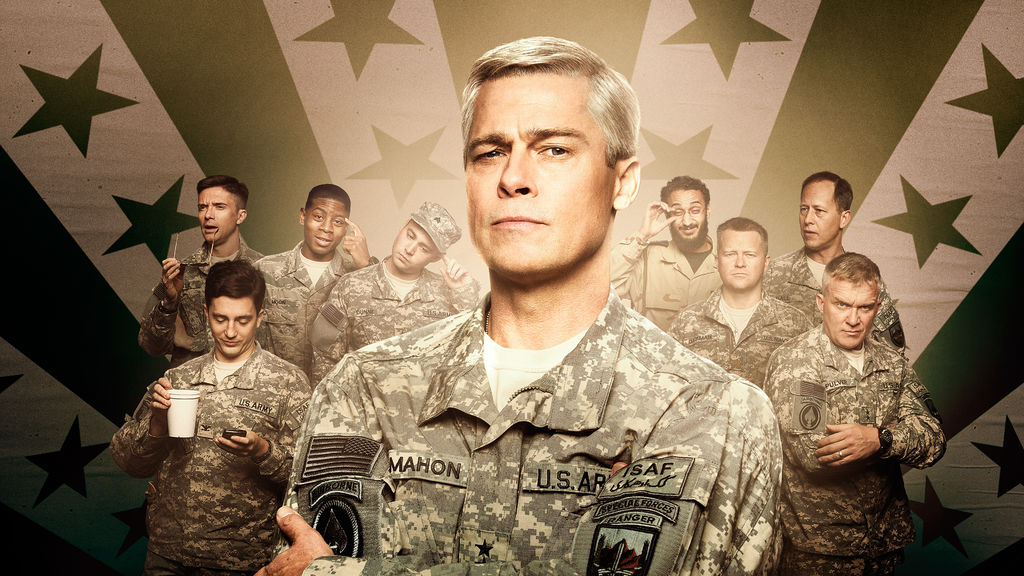
The issue of Rolling Stone released in 2010 contained an article titled “The Runaway General” by a journalist named Michael Hastings. He was tasked to follow around a general who was just hired to find closure for the United States in the war against Afghanistan. War Machine, the cinematic adaptation of that event, features a scene where the journalist (named Sean Cullen, played by Scoot McNairy) first meets the general (named Glen McMahon, played by Brad Pitt). It’s a brief scene, but pivotal nonetheless. Towards the end of their moment together, McMahon mentions how he wants to be on the cover of the issue. Cullen mentions that it’s between him and Lady Gaga, and after a joke is spoken, McMahon breaks his laughter and sternly tells Cullen “I’m deadly serious, son. Put me on the cover.” Cullen continues to laugh. McMahon does not.
War Machine is the latest outing from writer/director David Michôd, who has brought us the fantastic Animal Kingdom and the undervalued The Rover. Michôd is obviously no stranger to the progress—to be specific, the deterioration—of central characters. Notice how I didn’t say protagonists or antagonists; just central characters. The grey balance that he inserts for this performers are fascinating to say the least. The results are never truly the same, and the journey for some characters are more rewarding than the others.

Michôd had a bit of his work cut out for him in this account of real-life Gen. Stanley McChrystal. The aforementioned Rolling Stone article was turned into the book “The Operators: The Wild and Terrifying Inside Story of America’s War in Afghanistan” by Hastings himself (he died under mysterious circumstances in June 2013), and it details what happened under McChrystal’s brief rule. While, yes, this is a fictional and stylized account of what happened, it’s still based on some fascinatingly scary ideals and events. After growing weary of the eight-year war in Afghanistan, the President and some higher-ups hire McMahon and his crew to bring the war to a dwindling close. After finding success of Iraq, the powers-to-be feel McMahon can get the job done quickly—and more importantly—efficiently. McMahon, however, sees things differently. After taking a tour of the country, he decides that the U.S. can win the war after all, in a grand plan that involves more soldiers (which he tricks his bosses into giving) and the support of our country’s allies (which he doesn’t fully have).
“Hubris” is a word that’s only mentioned once, but it’s the embodiment of War Machine. Firstly, Michôd does a splendid job of bringing political drama to life. There’s a lot of dialogue and breakdowns for a war film featuring just a few minutes of action, but you can tell when a script is in good shape when the words spoken are more captivating than the bullets flying. There’s a stellar scene involving a cameo by Tilda Swinton, playing an elected official of Germany, where she and Pitt’s McMahon go toe-to-toe on his plan to win the war. Without any evident effort, the scene becomes the film’s core. McMahon’s hubris is called into question, and it wraps around the rest of the runtime with the look at a man’s belief system, with a pen and paper and a scoff. His higher ups have a better plan to end the conflict in Afghanistan. The vice president has a better plan, but he will just not hear it.

I’m very interested to find out more about the Stanley McChrystal, to see if he really looked/acted/walked as lively as Brad Pitt portrays him. And if it were nothing like the real-life man, then so be it; I’d still feel Pitt had a hell of a time playing the well-meaning stooge. You have to admire Pitt for having an unconventional filmography, for his role choices and as a filmmaker, for his continued devotion to bringing heavy and possibly impactful stories under his production company Plan B. He walks an extremely fine line between the dramatic and the comedic journey of McMahon, and would it surprise you that he does it masterfully? Yet, there’s a flip side to that. While he finds and walks said fine line well, the film has a little bit of trouble handling its balance, but only some of the time. It’s not funny enough to be considered a full comedy, nor dark enough to be considered a dark comedy, but there are some truly funny scenes. It’s dramatic, but not too heavy in its presentation to be considered a full-blown drama. While the film looks beautiful enough thanks to cinematographer Dariusz Wolski (The Martian, Alien: Covenant), it doesn’t help decide what genre it is.

This may sound weird, but I feel like films such as War Machine can’t find a solid genre to stick to because ultimately it doesn’t care; it’s here to tell us an account of a seriously messed-up non-fictional story. You laugh at the audacity of the situations that happen, both in the film and in real life. As it’s pointed out at some point…what was McMahon thinking talking to a Rolling Stone reporter? Michôd takes this absurd, nearly unbelievable account of the U.S.’s swan song in Afghanistan, and puts his special touches on it; the writing its engaging, the performances all around are presented vigorously, and the direction is sturdily invested. As of this writing, the film is getting some mixed views. That’s not surprising. I’m rooting for War Machine to have a lasting presence as an intriguing war film for the modern age. Oh and one more thing, and I surely hope Michôd meant for this reaction: the biggest laugh comes in the final few seconds of the film.
Maybe this is a comedy after all…




